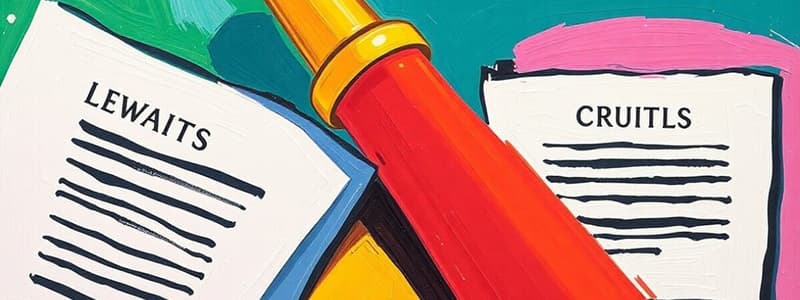Podcast
Questions and Answers
When is a sole practitioner able to issue a valid receipt for the proceeds of a land sale?
When is a sole practitioner able to issue a valid receipt for the proceeds of a land sale?
- Only when the sale involves a share in a company.
- When the sale is completed by multiple practitioners working together.
- Always, regardless of the number of practitioners involved.
- When there is a single practitioner handling the sale. (correct)
What is the primary method for PRs to protect themselves against claims from unknown creditors, according to the provided text?
What is the primary method for PRs to protect themselves against claims from unknown creditors, according to the provided text?
- Obtaining a Benjamin Order from the court.
- Purchasing insurance against the risk of a missing claimant.
- Placing advertisements in the *London Gazette* and other relevant newspapers. (correct)
- Distributing the estate with an indemnity from the beneficiaries.
When a PR cannot locate a known beneficiary, which action is NOT mentioned as a possible option?
When a PR cannot locate a known beneficiary, which action is NOT mentioned as a possible option?
- Distributing everything with an indemnity from the beneficiaries.
- Making payment owed to the beneficiary into a designated account. (correct)
- Distributing the estate with an indemnity from the beneficiaries.
- Seeking a Benjamin Order from the court.
What is the primary purpose of a Benjamin Order, according to the text?
What is the primary purpose of a Benjamin Order, according to the text?
What is the legal principle that PRs must pay estate creditors before distributing assets to beneficiaries?
What is the legal principle that PRs must pay estate creditors before distributing assets to beneficiaries?
According to the content, which legal framework allows potential claimants to make claims against an estate?
According to the content, which legal framework allows potential claimants to make claims against an estate?
If a PR is concerned about a possible claim under the Inheritance (Provision for Family and Dependants) Act 1975, what action should they take?
If a PR is concerned about a possible claim under the Inheritance (Provision for Family and Dependants) Act 1975, what action should they take?
Under what circumstances would a PR be justified in selling property specifically gifted in a will to pay debts?
Under what circumstances would a PR be justified in selling property specifically gifted in a will to pay debts?
What is the primary function of the London Gazette, as described in the content?
What is the primary function of the London Gazette, as described in the content?
Which of the following is NOT a valid option for a PR when they cannot find a known beneficiary or creditor?
Which of the following is NOT a valid option for a PR when they cannot find a known beneficiary or creditor?
If a will specifies that debts should not be paid from the residue, how will unsecured creditors be paid?
If a will specifies that debts should not be paid from the residue, how will unsecured creditors be paid?
In an insolvent estate, which type of debt is paid first?
In an insolvent estate, which type of debt is paid first?
In an insolvent estate, which of the following would be considered a "preferred debt"?
In an insolvent estate, which of the following would be considered a "preferred debt"?
If a will specifies that debts should not be paid from the residue, and the estate has insufficient pecuniary legacies to cover the outstanding debts, how will the debts be paid?
If a will specifies that debts should not be paid from the residue, and the estate has insufficient pecuniary legacies to cover the outstanding debts, how will the debts be paid?
In the context of unsecured debt payment, what does "proportionate" mean?
In the context of unsecured debt payment, what does "proportionate" mean?
When a will specifies that a gift of property is "free of mortgage", what does this mean in terms of debt payment?
When a will specifies that a gift of property is "free of mortgage", what does this mean in terms of debt payment?
Which of the following is NOT considered an unsecured debt in an insolvent estate?
Which of the following is NOT considered an unsecured debt in an insolvent estate?
If a will specifies that debts should not be paid from the residue, and the estate does not have enough funds to pay all debts in full, how will the debts be paid?
If a will specifies that debts should not be paid from the residue, and the estate does not have enough funds to pay all debts in full, how will the debts be paid?
In an insolvent estate, which of the following types of debts has the lowest priority for payment?
In an insolvent estate, which of the following types of debts has the lowest priority for payment?
If an estate has sufficient funds to cover all liabilities, how will the unsecured creditors be paid?
If an estate has sufficient funds to cover all liabilities, how will the unsecured creditors be paid?
Flashcards
Unsecured creditors
Unsecured creditors
Creditors who have no legal claim on specific assets of the deceased.
Residue of the estate
Residue of the estate
The remaining assets after all specific gifts are distributed.
Unsecured debts paid from legacies
Unsecured debts paid from legacies
When a will instructs to pay debts from the residue, but there isn't enough, unpaid debts are paid proportionally from specific legacies given in the will.
Insolvent Estate
Insolvent Estate
Signup and view all the flashcards
Secured debts
Secured debts
Signup and view all the flashcards
Unsecured death
Unsecured death
Signup and view all the flashcards
Funeral & administration expenses
Funeral & administration expenses
Signup and view all the flashcards
Preferred debts
Preferred debts
Signup and view all the flashcards
Ordinary debts
Ordinary debts
Signup and view all the flashcards
Deferred debts
Deferred debts
Signup and view all the flashcards
Sole Practitioner Land Transfer
Sole Practitioner Land Transfer
Signup and view all the flashcards
PR Liability to Beneficiaries
PR Liability to Beneficiaries
Signup and view all the flashcards
PR Protection from Unknown Claims
PR Protection from Unknown Claims
Signup and view all the flashcards
Dealing with Missing Beneficiaries
Dealing with Missing Beneficiaries
Signup and view all the flashcards
Waiting Period for Inheritance Claims
Waiting Period for Inheritance Claims
Signup and view all the flashcards
Priority of Creditors
Priority of Creditors
Signup and view all the flashcards
Protecting Specific Gifts
Protecting Specific Gifts
Signup and view all the flashcards
PR Protection Publications
PR Protection Publications
Signup and view all the flashcards
Benjamin Order
Benjamin Order
Signup and view all the flashcards
Seeking a Court Order
Seeking a Court Order
Signup and view all the flashcards
Study Notes
Wills and the Administration of Estates
-
Unsecured creditors should be paid from the estate's assets in the following order:
- Property undisposed of by the will (for example, in a partial intestacy), then Residue
- If the will provides debts specifically provides should be used for the payment of debts (if any)
- Property that the will specifically provides
- From pecuniary legacies which abate proportionally - so if one pecuniary legacy is £10,000 and the other is £20,000 and funds are needed
- If there are no pecuniary legacies or they weren't sufficient to pay the debts owed, from specifically devised or bequeathed property; proportionally to the property's value compared to the whole
- If a gift provides a property that is "free of mortgage", the mortgage must be paid insofar as the residue is available
-
If an estate is insolvent (that is, it doesn't have sufficient funds to pay reasonable funeral, testamentary, and administration expenses, debts, and other liabilities in full), debts should be paid in the following order:
- Secured debts should be paid first, from the property against which it is secured - subject to the testator showing any contrary intention in the will
- Unsecured debts should be paid in the following order with each creditor within the same rank ranking equally, so if money runs out in that rank, their payment abates proportionally
- Reasonable funeral and administration expenses
- Preferred debts – wages and salaries of the deceased's employees in the four months prior to death, up to a maximum of £800 each
- Ordinary debts – including money owed to HMRC and the balance of pre-deferred debts
- Interest on preferred and ordinary debts from the deceased's spouse
Studying That Suits You
Use AI to generate personalized quizzes and flashcards to suit your learning preferences.
Description
Test your understanding of the processes involved in wills and the administration of estates. This quiz covers topics such as the order of payment to unsecured creditors, handling insolvent estates, and specific provisions made in a will. Sharpen your knowledge on estate management and legal responsibilities.



